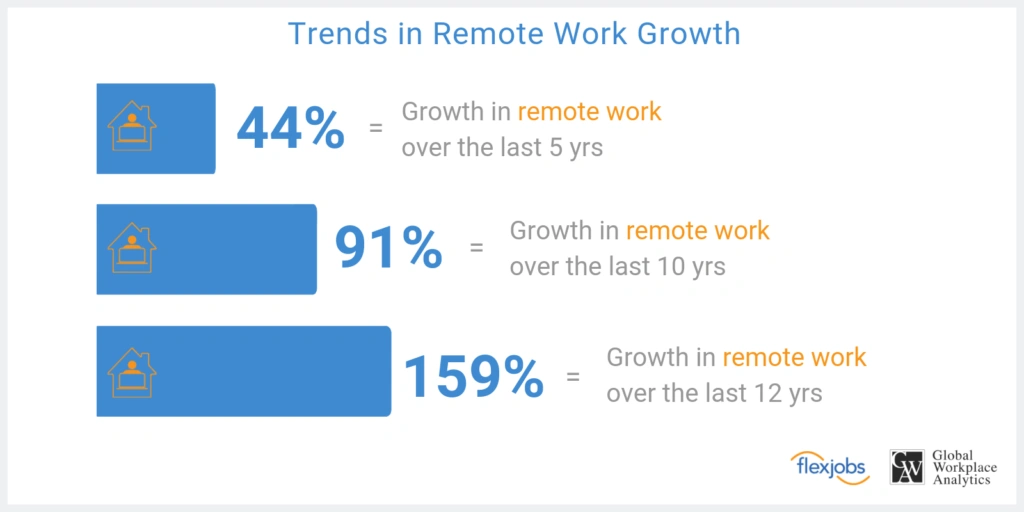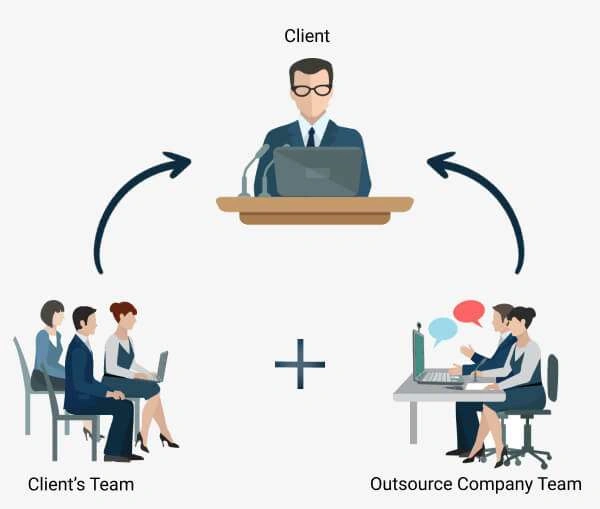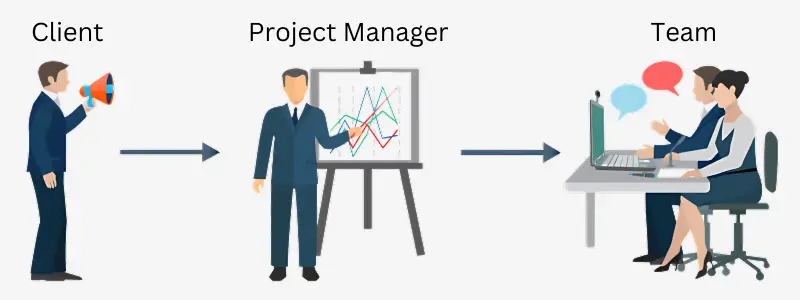Hiring remote developers is more than just a trend, it's a strategic move that can transform your business.
As companies worldwide embrace the benefits of a digital workforce, accessing top talent from anywhere has become a critical advantage.

(Source: Flexjobs)
The trends were always in favor of remote.
Whether you're a startup ready to scale or an established enterprise looking to innovate, knowing how to hire remote developers effectively can set you apart from the competition.
Imagine having the freedom to build your dream team without being limited by geography. With remote developers, you gain access to a global talent pool, bringing in fresh ideas and diverse perspectives that can drive innovation.
Plus, the cost savings are significant, think lower overheads, reduced office expenses, and the flexibility to hire the best talent, regardless of location.
Remote work also leads to happier, more engaged employees who value flexibility and work-life balance.
But the key to success lies in getting it right. There's a lot to consider, from finding the perfect candidates to ensuring they integrate seamlessly into your team.

This blog will walk you through everything you need to know about hiring remote developers so you can build a strong, cohesive team that delivers exceptional results no matter where they're located.
Why You Might Need a Remote Development Team?
Work from home is great. But first, you must identify the reason you might need a remote team.
The reasons should be concrete and inspire you to act towards hiring a remote developer.
Here are a few reasons that can drive you towards hiring a remote development team:
1. Lack of Desired Skillset Internally
Your product or idea evolves with time. This can also mean that your existing team isn't equipped to handle the bigger aspirations and end development goals on their own.
Sometimes, the skillset isn't refined for more. Sometimes, your developers might not be familiar with a new technology.
In such cases, it leaves a few options, either you train your workforce (which can be a costly and risky endeavour) or hire new team members (which again would mean costly onboarding).
Remote team saves you from the hassle and brings cost-efficiency as it is cheaper to hire expert remote developers with desired skill sets than to train your internal teams.
2. Increasing Development Costs
Software and app development are costly affairs. Developers are some of the highest-earning professionals in the world.
Top it up with the costs of development locally (tech costs, overheads, etc.) and you might find it isn't a good idea, essentially if you are just starting up or have limited sources of funds.
Remote mobile app development teams come to your rescue in such cases. They can offer quality work at a fraction of the cost of developing internally.
3. Improving Time to Market (TTM)
Let's say you have a great idea, but the opportunity is time bound. Or say you fear a competitor launching ahead of you.
In such cases, a remote developer's team can improve your development capabilities and thus boost TTM metric.
You can quickly release an MVP, iterate and launch your product when you have more minds working for you.
So, hiring remote developers can bring down the time-to-market while not affecting costs much.
4. Challenging Management of Internal Teams
With employees under your payroll, you need some set processes and systems.
Let's say if you bring developers on-board, you may find it challenging to manage the HR policies, set productivity systems, give them hardware and arrange for a streamlined workflow.
With remote teams, these problems are addressed right away.
Most remote developers are self-sufficient in terms of workflow management and can even guide you to achieve highest efficiency and productivity.
This brings down costs of management along with reduced hassle of controlling and managing resources.
Types of Remote Hiring Models
Before we jump deeper into the specifics of hiring remote developers, there is something you should know about the different models.
Work from home can happen from anywhere in the world.
While some organizations prefer hiring locally for remote work, some work with developers from different countries.
Here are some popular ways to hire a remote developer:
1. Local Remote Work/jobs
This is not much common but a viable remote hiring option.
Companies look for freelancers and consultants locally – in their city, state or country and engage them on a project basis.
2. Outsourced Remote Work

This is one of the most popular engagement models.
In the outsourcing model, you can engage a company/team for the entire project.
Generally, the outsourcing/remote development company is situated out of your country (cost benefits) and takes care of day to day activities like hiring the staff, managing the resources.
The end goal of an outsourced model is to complete the project successfully.
3. Out-staffed Remote Work

The out-staffing model is a unique model where you can hire remote employees who are under the payroll of any other agency.
Generally, the out-staffing agency takes care of wages, bonuses, etc. while the employee works with you on your project.
Preparing for Remote Hiring
Jumping the boat from an in-house team to a remote team shouldn't be an impulsive decision.

Rather, you will have to prepare your organization for work from home. Here are some steps you'll have to take for hiring remote developers.
1. Become Remote-ready (Building Business Processes)
If you're engaging top remote developers for the first time, then you'll have to build some infrastructure at your end. Basically, this would involve preparing for success in remote management.
If hiring developers is your priority, you'll likely require the following for seamless communication, collaboration and project management:
- Central code repository solutions such as Git or Bitbucket
- Document/file-sharing solutions like Google Drive
- Project management tools such as Jira, Trello, Asana or Monday
- Communication tools like Slack, Skype, and Hangout
- Video calling solutions, Skype, Zoom, Google Hangouts, etc. would work
While email can do several things if you want to scale and take full advantage of remote work, you'll need to use tools that simplify work for you and your remote team.
2. Define Clear Development Outline
You must know that remote development teams have varied skill sets. Each developer has a unique strength.
To achieve desired success, ask yourself, “What am I looking for in a remote developer?”
Define a clear development outline, create an insightful job description and list all the skills you seek in a remote developer you're intending to hire.
Will you be requiring help with the backend development? Do you need a clean code? Do you want something specific? Add everything to your front-end & Back-end development outline.
Think of it as the guiding light in the darkness. If you manage to create an exhaustive outline, there are higher chances of remote development success.
3. Screening & Interview Process
Understand one thing. As you open your gates to the remote world, you will be flooded with gifted talent worldwide.
This means more time is needed to screen and discover the desired talent. You will need a proper screening and interviewing process.
Having a proper process will help you get each candidate and schedule interviews with the most promising ones.
There are a few must-have skills you need to evaluate in each and every candidate you interview.
Things to Look for in a Remote Development Team
Once you have things sorted at your end, it is time to start evaluating the talent. Well, you need to have a keen eye for a few skills while interviewing a candidate:
1. Deep Understanding of the Requirement
Any candidate you consider for hiring remotely must have a deep understanding of your requirements. It goes without saying that you should ask several questions about the technology or framework.
You can even give them a small project aligned with your actual requirements to gauge their depth of understanding regarding a technology or stack.
2. Demonstrated and Relevant Track Record
You must check the dedicated hiring developer's past portfolio and analyze if the work done previously is relevant to your project.
Ask them to share credible and relevant samples from the projects they executed in the past.
Check if their projects depict their expertise, critical thinking ability and expertise.
You must realize that the top app developers must have a critical mindset and problem-solving approach because web and app development can get tricky at points.
A developer with a relevant track record would help you sail through turbulent tide and take you through.
3. Experience of Working Remotely
Not everyone can work remotely even if they are good at their work. So, you should carefully choose resources who have worked remotely in the past.
Without direct supervision, not everyone can work towards a goal.
So, you will want someone who understands the nitty-gritties of remote work, is self-motivated and can produce results without constant supervision.
Steps You Should Take Before Actually Hiring A Remote Developer
1. Define Project Timeline
As said earlier, having a clear outline helps immensely. Just like a clear outline, you will have to define the exact project timeline.
This will help developers understand your expectations better and plan their work for maximum productivity.
At the same time, timelines give a sense of discipline and orderliness to something unknown- like working from miles apart without any real contact.
So, if you want to hire a remote developer and want to leverage his/her expertise, you need to be quite clear in your outline, approach and timeline.
As you know, any goal should be SMART – Specific, Measurable, Attainable, Realistic and Time-bound.
Talking of time-bound, it is essential to have a proper timeline for each sprint, a feature you want to add or an app you want to build.
2. Contract
Once you have finalized on a resource and have clear timelines and goals, the most important step is to formalize the engagement.
Just like an employment contract, your remote hiring contract should include everything you want to enforce. Some essential points to include in your contract are:
- Roles and responsibilities
- Engagement fee/salary/rates
- Goals
- Timelines
- Availability
- Termination
- Ownership of Assets
- Non-disclosure
3. Configure Tools & Providing Access
We talked about being remote ready by using tools and platforms. Now, before you engage with someone remotely, it's important to set up a proper collaboration structure.
Think of email service, code repository, communication, file sharing, instant messaging, project management and video conferencing to start with.
Configure everything and prepare to provide access to your remote developers securely.
4. Invite & On-board
Once you're ready, it's time to welcome your new remote resource to your startup or company.
The best way to do so is having a standard onboarding process.
You might want them to be familiar with everything and everyone.
You would also like them to understand the culture- what's expected and what's not.
Give them the access to everything they need and make them comfortable to integrate in your work processes.

5. Schedule Routine Engagement Sessions or Calls
Your remote team must not feel left out. At the same time, you must ensure that there is some form of connect and coordination.
Scheduling meetings, engagement and project update sessions would make them more accountable.
Having regular meetings (daily, weekly, fortnightly) would also eliminate issues due to time zones and would ensure timely product launch.
At the same time, it would make your organization more inclusive. Something every startup is striving for.
6. Continuous Evaluation
You have a great remote team. You have the processes. You have everything in place.
But this can quickly crumble if you don't evaluate the performance.
So, its important to keep evolving your performance standards and continuously evaluate the work being done remotely.
Not only will this improve your end-results but will also make you a better, serious and committed organization.
Best Countries to Hire Remote Developers
1. India
India is traditionally known as a country of thinkers, tech geeks and high-quality remote developers.
Proficiency with English language, commitment to goals and deep understanding of innovative technologies are some of the traits in favor of remote Indian developers.
You might realize the potential of Indian engineers and developers by the fact that all major tech companies have a huge workforce hailing from India.
2. Argentina
Argentina is known to have a sound tech ecosystem right from the school level. Technological literacy is high making it one of the lucrative options to hire a remote team.
Though Argentinian developers are proficient with several technologies, the slow internet speeds and non-English speaking audience can sometimes ruin things for a demanding project.
3. Ukraine
Ukraine has a strong educational backend that prepares its engineers for the IT industry. Many companies, schools and universities offer free tech education with employment options.
Ukrainian tech guys are great at software and app development.
But being a non-English speaking country practically behind the iron curtain can bring a lot of challenges during project execution.
4. Poland
Developers from Poland are known for high-end QA and usability testing. They are even good with several programming languages.
Though the lack of English as a major language and low population can make Poland costly for remote hiring.
Wrapping Up
Finding and hiring a remote developer is a hard task. Not everyone would match your wavelength. It can take some time.
But it's always better to look forward towards industry trends.
Right now, top Indian developers are highly sought-after because of cost benefits, easy coordination and commitment towards goals.
If you're thinking of hiring a remote developer for your startup, we are ready with everything we have.
Our strong track record and an expert team onboard can promise you best results for your innovative startup in custom app development, web development or any other specific technology.
Get in touch with our experts and experience the difference!
FAQs
Q: How can I hire dedicated developers in India?
A: To hire dedicated developers in India, you can either work with a reputable tech company that provides remote developer services or use freelance platforms to find individual developers for your project.
Q: What are the benefits of hiring remote developers for your business?
A: Hiring remote developers can provide cost savings, access to a global talent pool, flexibility in scaling your team, and the ability to have round-the-clock development work on your projects.
Q: How can I manage a remote team effectively?
A: To manage a remote team effectively, use communication tools like Slack or Zoom, establish clear goals and deadlines, schedule regular check-ins, provide feedback and support, and foster a positive team culture.
Q: What is the cost of hiring remote developers in India?
A: The cost of hiring remote developers in India varies depending on the developer's expertise, experience, and the scope of your project. Generally, hiring remote developers in India can be more cost-effective compared to hiring in-house developers in western countries.
Q: How to hire a dedicated development team in India for my next project?
A: To hire a dedicated development team in India for your next project, you can reach out to tech companies that offer dedicated team services, review portfolios and client testimonials, conduct interviews with potential team members, and establish clear project requirements and expectations.
Q: What are the best practices for working with remote developers?
A: Some best practices for working with remote developers include setting clear project goals and expectations, providing detailed instructions and feedback, establishing regular communication channels, utilizing project management tools, and fostering trust and collaboration within the remote team.
Q: Why hire remote app developers for your software development project?
A: Hiring remote app developers can bring specialized expertise to your project, allow for faster development timelines, provide cost-effective solutions, and offer access to a diverse talent pool of app development professionals.


